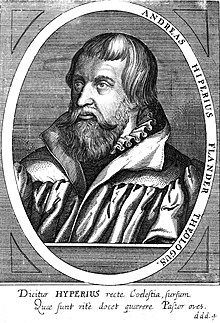Andreas Hyperius
Andreas Hyperius (Latinized from "Ypres", the name of his native town), actually Andreas Gerhard (born May 16, 1511 in Ypres ; † February 1, 1564 in Marburg ), was a Reformed theologian, university professor and reformer.
Life
Andreas Gerhard was the son of a respected lawyer. He was born as Andreas Gerardi in Flanders. With a humanist background, he led the usual scholar life since he was twelve. In 1523 he learned in Lille , in 1528 in Leuven . From there he went to Paris as a master to study theology and canon law. Johannes Sturm , with whom he was friends there, led him to the Reformation view.
Now he went to German universities where Protestant theology was represented. When his paternal legacy was exhausted and he could not find a job at home or in England , he turned to his compatriot Gerhard Geldenhauer , who held him in Marburg. Here he succeeded him as professor of theology. After a long period of hiking he found his permanent field of activity here. He married Catharina Ort.
At the university he gained a high reputation. He represented Martin Bucer's theology and gave mainly exegetical lectures. His main encyclopedic work De recte formando theologiae studio and his homiletics De formandis concionibus sacris made him known.
Since then he has been considered the founder of a scientific doctrine of preaching. It is also of great importance for the Hessian regional church. Landgrave Philipp had great confidence in him and called him to all synods and visitations. Finally he worked out a state agenda , which appeared posthumously in 1566, but was replaced by another in 1574.
Fonts
- De formandis concionibus sacris. Marburg 1553.
- De recte formando theologiae studio. Basel 1556.
literature
- Heinrich Heppe : Hyperius, Andreas . In: Allgemeine Deutsche Biographie (ADB). Volume 13, Duncker & Humblot, Leipzig 1881, pp. 490-492.
- Real Encyclopedia for Protestant Theology and Church . Volume 8: Hesse - Jesuit women. 3rd, improved and increased edition. Hinrichs, Leipzig 1900, pp. 501–506.
- KF Müller: Andreas Hyperius. A contribution to its characteristics. Eckardt, Kiel 1895.
- Martin Schian : The homiletics of Andreas Hyperius, their scientific significance for practical theology. In: Journal of Practical Theology. Jg. 18, 1896, ISSN 0179-6224 , pp. 289-324; Vol. 19, 1897, pp. 27-66, S, 120-149.
- Walter Caspari : The efforts of Andreas Hyperius in the field of practical theology. In: Festschrift from His Royal Highness to Prince Regent Luitpold of Bavaria for his 80th birthday presented by the University of Erlangen. Volume 1: Theological Faculty. Deichert, Erlangen et al. 1901, pp. 83-104.
- Andreas Hyperius: The homiletics and the catechetics of Andreas Hyperius. Translated into German and with introductions by E. Chr. Achelis and Eugen Sachsse. Reuther & Reichard, Berlin 1901.
- W. Kantzenbach : Andreas Hyperius, professor of theology in Marburg. In: Yearbook of the Hessian Church History. Vol. 9, 1958, ISSN 0341-9126 , pp. 55-82.
- Dieter Frielinghaus : Ecclesia and vita. Studies on the ecclesiology of Andreas Hyperius (= contributions to the history and teaching of the Reformed Church. Vol. 23, ZDB -ID 503128-x ). Neukirchener Verlag, Neukirchen-Vluyn 1966 (at the same time: Göttingen, Univ., Diss., 1956).
- Hannelore year: Hyperius, Andreas. In: New German Biography (NDB). Volume 10, Duncker & Humblot, Berlin 1974, ISBN 3-428-00191-5 , p. 108 f. ( Digitized version ).
- Gerhard Krause : Andreas Gerhard Hyperius. Life, pictures, writings (= contributions to historical theology. Vol. 56). Mohr, Tübingen 1977, ISBN 3-16-140122-0 .
- Friedrich Wilhelm Bautz : Hyperius, Andreas. In: Biographisch-Bibliographisches Kirchenlexikon (BBKL). Volume 2, Bautz, Hamm 1990, ISBN 3-88309-032-8 , Sp. 1233-1235.
Web links
- Literature by and about Andreas Hyperius in the catalog of the German National Library
- Entry on Andreas Gheeraerdts in the professorial catalog of the Philipps University of Marburg
| personal data | |
|---|---|
| SURNAME | Hyperius, Andreas |
| ALTERNATIVE NAMES | Gerhard, Andreas (birth name) |
| BRIEF DESCRIPTION | Reformed theologian and reformer |
| DATE OF BIRTH | May 16, 1511 |
| PLACE OF BIRTH | Ypres |
| DATE OF DEATH | February 1, 1564 |
| Place of death | Marburg |
